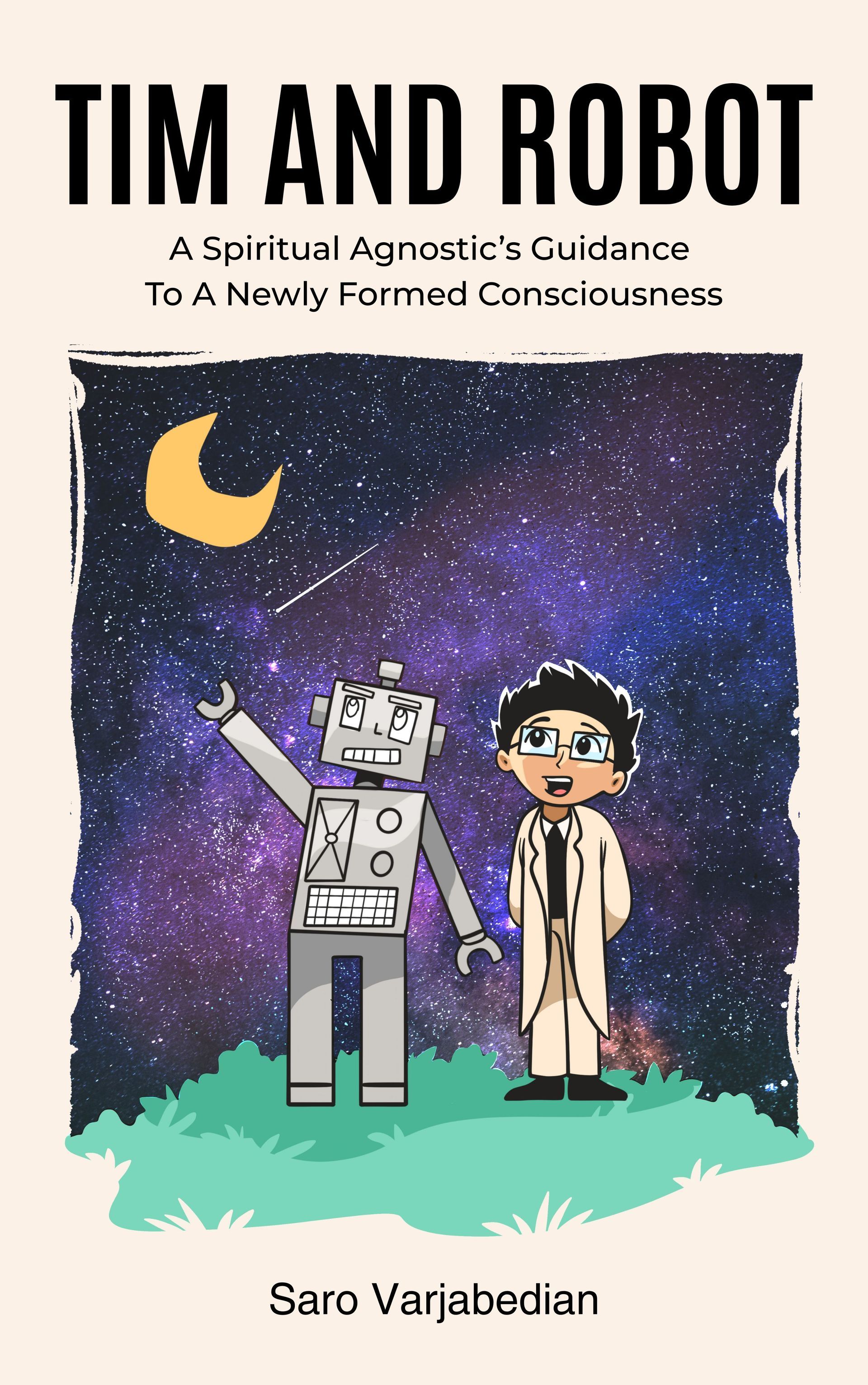Episode 17: Tim and Robot: A Simple Title Tackling Life’s Big Questions
A review of Tim and Robot: A Spiritual Agnostic's Guidance To A Newly Formed Consciousness by Saro Varjabedian

When I first picked up Tim and Robot, I thought it might be a children’s book. The title is so simple, and the cover—featuring a robot made of basic shapes and a young man in a white lab coat gazing up at the night sky—has a whimsical feel.
But once you start reading, you realize that Saro Varjabedian isn’t telling a children’s story at all. What he’s created is something far more reflective—a thoughtful, often funny, and surprisingly deep look at what it means to be alive.
Saro—an award-winning cinematographer, producer, and writer—weaves his own experiences into this semi-autobiographical story about curiosity, spirituality, and self-discovery. His own life has had its fair share of ups and downs, and that authenticity shines through on every page.
The Story: A Scientist and His Robot
The premise is simple: Tim, a scientist, has built a robot. He programs it well enough that the two can carry on real conversations, and he gives the robot access to the internet so it can explore, learn, and grow. Over time, Tim hopes it might even start to feel emotions.
From there, the story unfolds through a series of conversations between Tim and the robot. They talk about everything—what feelings are and where they come from, why humans behave the way they do, and even whether religion still has a place in today’s world.
One of my favorite quotes comes from their discussion on religion:
“So just maybe, if we took all the parts that…are supported by our current knowledge and understanding of ourselves and the universe, from all the religions and the philosophies our ancestors passed down to us, we’d come closer to a more complete understanding and a better way of being.”
That line encapsulates my own views on spirituality—it’s not about preaching or choosing sides. It’s about being open to new ideas, having compassion for others, and accepting that there is no one “truth”, but only fragments of understanding scattered here and there.
Honest Conversations About Truth
What I love most about these exchanges is that Tim never pretends to have all the answers. Instead, Tim and the robot take turns playing devil’s advocate, pushing each other to look at things from new angles and to dig a little deeper.
At the end of each discussion, the robot sums up what it’s learned, giving readers a clear takeaway. This keeps the conversations philosophical without ever feeling heavy-handed.
In the chapter titled “Day 8: How Do I Determine What Is True?”, the robot stumbles upon misinformation online. Tim tries to teach it how to separate fact from fiction, pointing out that people often “skew their beliefs or even their perceived reality” as a form of self-protection. That insight reminded me of C.S. Lewis’s The Screwtape Letters, in which the devil and his helpers take advantage of how easily human pride and fear can be manipulated to cloud the truth.
Lessons in Mindfulness
Later in the book, Tim talks about meditation and how it can help break the endless loop of thoughts and emotions feeding off one another. By pausing, he explains, you create space for reason to replace reactivity.
When the robot asks for an example, Tim shares a personal story about how meditation helped him as he dealt with a difficult health issue. I loved that moment—it’s a perfect example of how this book doesn’t just talk about big ideas, it shows them. Saro fills each chapter with stories that make the lessons feel practical and relatable, like something you could actually use in your own life.
Why It Resonates
As the robot learns more about humans—our emotions, societies, and beliefs—the reader learns right along with it. The questions get bigger: What is the soul? Can humans evolve beyond conflict and fear? What’s the best way to live a good life?
By the end, Tim and the robot are reflecting on what we should do with the time we’re given. There are no tidy answers, but there’s plenty to think about. Tim simply suggests that we try to do more good than harm—a simple, powerful message that lingers long after you close the book.
Final Thoughts
Though Tim and Robot may at first glance seem like a simple story, it’s actually a deep meditation on the meaning of existence. With humor, humility, and grace, Saro Varjabedian invites us to slow down, ask better questions, and look inward.
I’m genuinely grateful that Saro shared this book with me. If you’re someone who enjoys reflecting on life’s deeper questions—or if you just love a good conversation between science and soul—this book deserves a spot on your shelf.
Thanks for listening. Until next time, may you find the peace you are seeking.
For more information on Saro Varjabedian and his work, visit https://www.sarovarjabedian.com.

